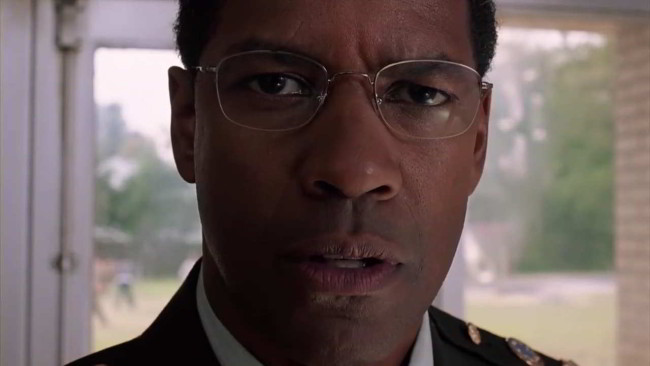It doesn’t matter whether or not you think it was worth remaking John Frankenheimer’s masterfully-made 1962 thriller, The Manchurian Candidate, or whether 2004 was the appropriate year for re-imagining a film that deals with the obsession of internal dissent, national self-destruction, political and social blindness, and the most precise and damaging marketing tool of all time: fear. Sure, the idea of a political assasination isn’t as frightening a concept as it once was—with memories of Kennedy’s popped head made so distant and fogged by the public consciousness. We’ve been too far removed from the notion of JFK and anarchical bullets—or maybe it’s a simple case of mental preparion, a defense mechanism: we’ve steeled ourselves for the possibility of political disarray. The idea of a gunned-down politician is too familiar a fear now. All the same, I think Jonathan Demme—the director of the 2004 re-imagining—does an effective job of ensnaring his audience with a paranoia so thick, so entwined, it quickly becomes more and more impossible to disassociate ourselves from Denzel Washington’s high-strung Iraq War veteran, Major Marc Bennett Marco. Just as he starts to sink into the quagmire, so do we.
And it’s not necessarily the script nor the character work that allows us to relate with Marco’s descent into possible delusion. It’s a combination of Demme’s insidious camerawork and comprehension of eyeline that reaches across the screen, like a long accusing finger, and taps us on the shoulder, whispering: “Now you’re apart of it, too.”
Despite a narrative set-up that would typically encourage scene after scene of action and thrills, The Manchurian Candidate is a dialogue-heavy film. Most of the movie consists of tautly-framed back-and-forths: of interrogations and investigations, of delusional renumerations. Marcos goes from player to player, from PTSD-victim Al Melvin (Jeffrey Wright) to Vice President candidate Raymond Shaw (Liev Schrieber), confronting them with a list of probing queries and eye-raising theories. These are top secret affairs that concern very high-profiled players. Very hush-hush, “manilla envelope” type shit—the type of WHITE MAN intrigue that can get you erased from the world. These are secrets and dealings that turn even the sanest men paranoid.
While watching the film, I had the sense that I was somehow involved with Marcos and his pursuit for the truth. I somehow felt as if I was walking around beside him, beside Shaw and the others. Whenever Demme would dive into one of his OTS back-and-forths, I would notice the characters looking somehow different, as if their eyes weren’t right. They weren’t looking where they were supposed to. Instead of looking off camera at the person across from them, they would stare directly into the lens, just off center. Assumingly, that’s where the other character is standing, as far as the scene’s sense of spatial awareness is concerned, but that point is right behind us—just where our shoulders reside. The placement of the camera, and the actors’ eyes, positions us within the scene, within the frame, it has forced us to take sides, to empathize deeper than we would usually care to.
Japanese filmmaker Yasujiro Ozu (Tokyo Story, Late Spring) used to break the fourth wall in similar fashion. It’s very possible he was the first director to ever utilize such exacting eyelines—and if not the first, then cetainly the most notable pioneer of its efficacy. Although, it must be pointed out, instead of illiciting paranoia, Ozu applied such intimate and probing eyelines to tease out our sense of guilt and duty; he wanted us to weigh the importance of familial loyalty, how it feels to abandon such domestic duties. Demme, on the other hand, uses it as a means to force us into positions we’re not quite comfortable with.
Shot flat, and with faces that look at us pointedly, unerringly, and with a screen huge enough and wide enough to make it nearly impossible to look away, Demme confronts us with empathy. Empathy for Marcos, even though he’s brainwashed into shooting one of his soldiers dead; empathy for Shaw, even though he drowns his ex-girlfriend, and her father, in their nearby lake; empathy for Mama Shaw, even though she rigs the electoral process in order to infiltrate the government with its very first corporately-owned president. And the empathy isn’t a choice—just as Marco and Shaw don’t have a choice when they’re hypnotized to kill. You’re forced to empathize: by the camera, by its placement, right above the dialogue recipient’s shoulder, along that very spot where Marco’s unit had microchips installed for monitoring their movements. It’s the same exact spot Marco rips into while chewing through Shaw’s shoulder. It’s exactly where an over-the-shoulder (OTS) shot would be framed from.
Coincidence?
Me thinks not.
It reinforces this idea of perpetual surveillance. Wherever you go, there’s some kind of technology, some microscopic piece of fiber optic mumbo jumbo, watching your every step. You can’t get away from the surveillance cameras at your local library nor the ones at your favorite arenas, nor can you get away from other people, other voyeurs, other snoops. Especially nowadays, given our neverending affinity for categorized data, for facebook and twitter, for instant interaction. And!—as Mr. Ed Snowden was nice enough to unearth for us—if you own a phone, a credit card, and activate Google Maps to help with navigation, you might as well start transmitting your own presence, like a beacon, announcing to any and all interested parties: “Hey! I’m right here! HEY! HEEEEEERE!” With all the cameras and phones and laptops littered throughout NYC, if you wanted to, you could walk through—and from—one camera to the next, and record yourself every step of the way. If you want to you could live an entire life recorded.
Every damn second of it.
No one likes it when someone towers over them, over their shoulder—reading what you read, seeing what you see. No one likes to share personal space. Not with strangers. That’s why Demme’s use of Ozu Eyes and OTS are so throat-clenching: it makes you feel as if a malevolent, Big Brother spirit is floating above you. It’s there, that ‘04 paranoia, crawling up the back of your spine, your skull, and wriggling into your eye sockets, uninvited, and broadcasting all your dirty, little business—all of it out there to be misconstrued.






